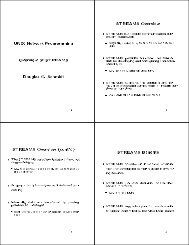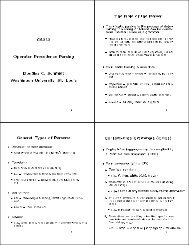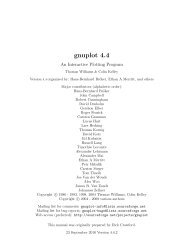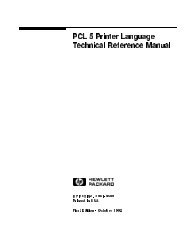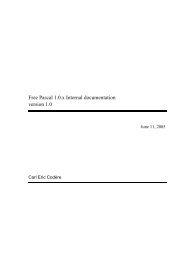The Orbix Architecture - Distributed Object Computing (DOC) group
The Orbix Architecture - Distributed Object Computing (DOC) group
The Orbix Architecture - Distributed Object Computing (DOC) group
Create successful ePaper yourself
Turn your PDF publications into a flip-book with our unique Google optimized e-Paper software.
(defaulted) trailing argument which corresponds to the optional exception argument for theclient.A server programmer can create an instance of foo and provide the foo service by telling<strong>Orbix</strong> that the server is now ready to receive bar requests. <strong>The</strong> simplest mainline is thus:// C++main () {foo_impl obj;CORBA::<strong>Orbix</strong>.impl_is_ready ();}Writing an <strong>Orbix</strong> Application - <strong>The</strong> Dynamic Invocation InterfaceUse of the IDL compiler, as above, requires a client to have available (possibly by dynamiclink loading) the marshalling stub code used to access any of the remote objects which itsuses.For some applications, this constraint may be too restrictive. CORBA specifies analternative, API-based, DII. <strong>Orbix</strong> provides the CORBA DII API. However, this API is, inour view, quite difficult to use and so we have provided an alternative stream based interface.Using the <strong>Orbix</strong> stream based DII the same client code as above can be written:char *result;long x;float y;char *z;TRY {// Initialise an object reference and a requestCORBA::<strong>Object</strong>Ref target =CORBA::<strong>Object</strong>::_bind ("16716:Fred","qwerty", IT_X);CORBA::Request r(target, “op1”);// stream in the arguments, and make callr



